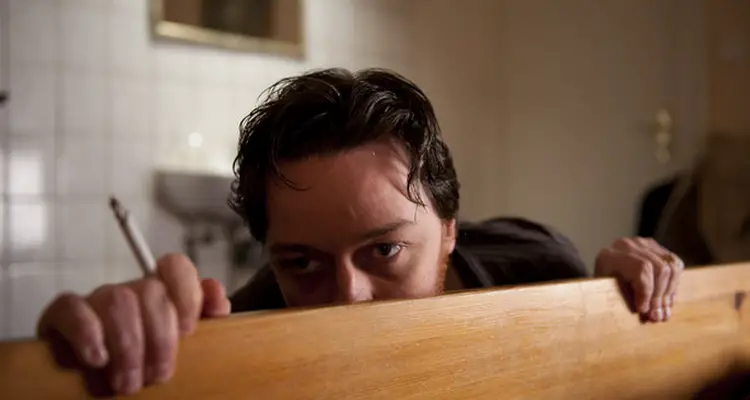FILTH Is A Display of Cynicism and Insanity

Manon de Reeper is the founder and CEO of Film…
When I first saw the trailer for Filth last year I got very excited about it. I love movies about corrupt cops, especially when they’re done well and the trailer promised a nice cinematography, as well. I finally got to watch it yesterday, and Filth didn’t disappoint.
Filth follows the life of Edinburgh detective Bruce Robertson (James McAvoy), who at first appears to be a bratty, violent and corrupt guy. He relishes in his violence, in the power he has as a cop. He drinks, snorts and frequents prostitutes, has sex with his colleague’s wife, bullies a wealthy but soft guy and is just all-round awful. His life revolves around the prospect of a promotion, but soon enough, it becomes clear that Bruce is not at all suited for the position. It is revealed that the wife and child he says are waiting at home left him some time ago although he tells his colleagues otherwise. Moreover, it becomes increasingly clear Bruce is suffering from serious mental illness, and hallucinations slowly start to take hold of his life.
The Good
Acting Performances
First of all, all credit must be given to James McAvoy. He’s developing into a multifaceted actor, and he performed brilliantly in Filth, giving the full 100% the character of Bruce Robertson needed; McAvoy was truly convincing in every nasty aspect of him. His BAFTA for Best Actor for this movie was well-deserved.
It must be said that although they were mostly outshone by McAvoy, the rest of the cast was great as well. Eddie Marsan was terrific as the naive Bladesey and Shirley Henderson was crazy fun as his gold digger wife, Bunty. Jamie Bell was just perfect as self-conscious and daft druggie Ray Lennox.
The Downward Spiral of Evil
Another major pro of this movie was the way Bruce’s evil was portrayed. At first, Bruce reveled in his evil, he was even giddy about it (e.g. the copy machine enlargement, which admittedly was really funny). The movie soon becomes a lot darker as Bruce spirals downwards and becomes nastier and nastier. He is so desperate to get a promotion he meddles and manipulates and deceives – he proves to be incredibly cunning and devious, and sadistic, too.
I’m unsure how this road to insanity was portrayed in Irvine Welsh’s original book as I haven’t read it, but in my opinion, director and screenwriter Jon S. Baird did a great job of displaying this kind of development towards insanity and evil on screen. At a certain point I couldn’t help but only feel pity and sympathy for Bruce, and that’s no small feat considering his nastiness.

Celebration of Magic Realism
I also thoroughly appreciated the absurdism, or magic realism, of the movie. All characters are deliciously over the top and the hallucinations where Robertson saw his psychiatrist were all sorts of crazy, as well as the intermezzos featuring Robertson’s mysterious wife, which did really pique my curiosity.
While I was annoyed with Oblivion recently because it so blatantly ripped off other science fiction films, I can’t help but appreciate the way Jon S. Baird celebrated two other filmmakers in his movie. He didn’t rip anything off, it was pure celebration.
The first is Terry Gilliam: the scenes with the psychiatrist were reminiscent of Brazil (not just because of Jim Broadbent) for its dreamlike quality and style, and I recognized more references to Terry Gilliam’s work throughout Filth. It was subtly and nicely done.
The second, Stanley Kubrick, was celebrated less subtly if you consider the 2001: A Space Oddysey poster in the Chief’s office was even pointed out explicitly. Furthermore, one of the scenes with Bruce’s wife clearly referenced Eyes Wide Shut. It felt like Bruce’s character was approached like a modern-day Alex of A Clockwork Orange: a deeply evil droog, but you end up sympathizing with him anyway.
Finally, the cinematography – Matthew Jensen did a great job for Filth. Many scenes were shot mostly in close-up, which added to the tone and intensity of the story and Bruce’s development.
The Bad
While the film’s magic realism was great fun, at first it was very confusing. It took a while for me to get a grip on the movie, as it jumps from pillar to post for most of the beginning of the film, skipping abruptly between scenes of Bruce’s life, his hallucinatory visits to his doctor and the scenes where we see his wife discuss their sex life. Although the purpose of this style became clear in the end, the beginning still felt chaotic.
One note has to be made regarding the performances of the cast: while most of them were great, a down point was the performance of Downton Abbey’s Joanne Froggatt, who was plain and uncharismatic in her role as recent widow Mary.

Finally, I didn’t like the way the movie ended. The way Bruce hissed “same rules apply” a second before the end felt cheap and unnecessary, and while still cynical, wouldn’t it have been much more cynical or more bitter to not let him have the final word? Though the ending of the movie was unsettling, this final shot broke the movie’s continuity and diminished the quality of the ending.
The Interesting
Cynicism and Corruption
Filth is an incredibly cynical movie. The introduction presents the way Bruce Robertson perceives the world, and with it, douses the audience with a bucket of cynicism. The world is presented as having gone to shit and people are all horrible.
Bruce Robertson is one of the most fascinating law enforcement characters I’ve seen in the past year. I always really appreciate the film noir-inspired cop: corrupt, alcoholic, lawless and morally ambiguous. Bruce goes very far in his corruption, and at around 32 minutes into the film, Bruce states that what’s great about being a cop is that he’s free to abuse people: they can’t stand up to him because he represents the law.

This reminded me of research that has been done regarding sociopaths: it’s a generally accepted theory that the ” biggest” sociopaths are generally found in positions of CEOs, firemen and of course policemen. Bruce is the very definition of a sociopath, though his sociopathy seemed to be chiefly driven by his out-of-control and untreated bipolar disorder.
The corruption doesn’t end with Bruce, however. The Chief is very eager to drop the case of the Japanese boy’s murder as soon as the media pays less attention to it. In Filth, corruption is represented as widespread and inescapable is a very cynical representation on its own, adding to the audience’s sense that crime isn’t fought and that the world is bleak. It is more like corruption is a given, certainly not the exception.
” You are Filth”
Filth does attempt to explain why Bruce is the way he is, and does it more elaborately than most films do, in fact. Most movies blame criminal behavior on one or two factors (like a bad environment or a mental disorder), instead, Filthsuggests his criminal behavior is driven by many:
- by his bipolar disorder, addiction and past trauma
- by his ambition to get the promotion
- by the fact his wife abandoned him
What remains unclear, however, is whether he was born bad. A common explanation for criminal behavior is biology: in so many movies, the criminal is an ugly man or was born to criminal parents. Somehow, it’s still an unconsciously accepted notion that looking unconventional means a less good heart. Just consider how Disney’s villains look.
The only hint we get regarding Bruce’s biology is that he may not have been his father’s real son. This father figure told him he was filth, not only because he didn’t prevent his younger brother from dying, but also because of his heritage. Eventually, because he was labeled as “filth” in his youth by someone he trusted, he could never see himself as otherwise.
This is exactly what made Filth good: they tried to explain Bruce’s motives from so many angles, it made him a much more real, multidimensional character. Criminal behavior is complex and can’t be explained by one or two factors.
Final Word
Filth explores a cop’s evil insanity to a great extent and does it very, very well. Assisted by a great cast and good cinematography, Jon S. Baird crafted a magical realistic story with a greatly complex protagonist that will stick with you.
I can heartily recommend Filth.
Agree with my observations of Filth, or not? Let’s discuss in the comments!
If you liked this article, please consider following FilmInquiry on Twitter and on Facebook! Thanks!
Does content like this matter to you?
Become a Member and support film journalism. Unlock access to all of Film Inquiry`s great articles. Join a community of like-minded readers who are passionate about cinema - get access to our private members Network, give back to independent filmmakers, and more.
Manon de Reeper is the founder and CEO of Film Inquiry, and a screenwriter/producer. Her directorial debut, a horror short film, is forthcoming in 2021.













